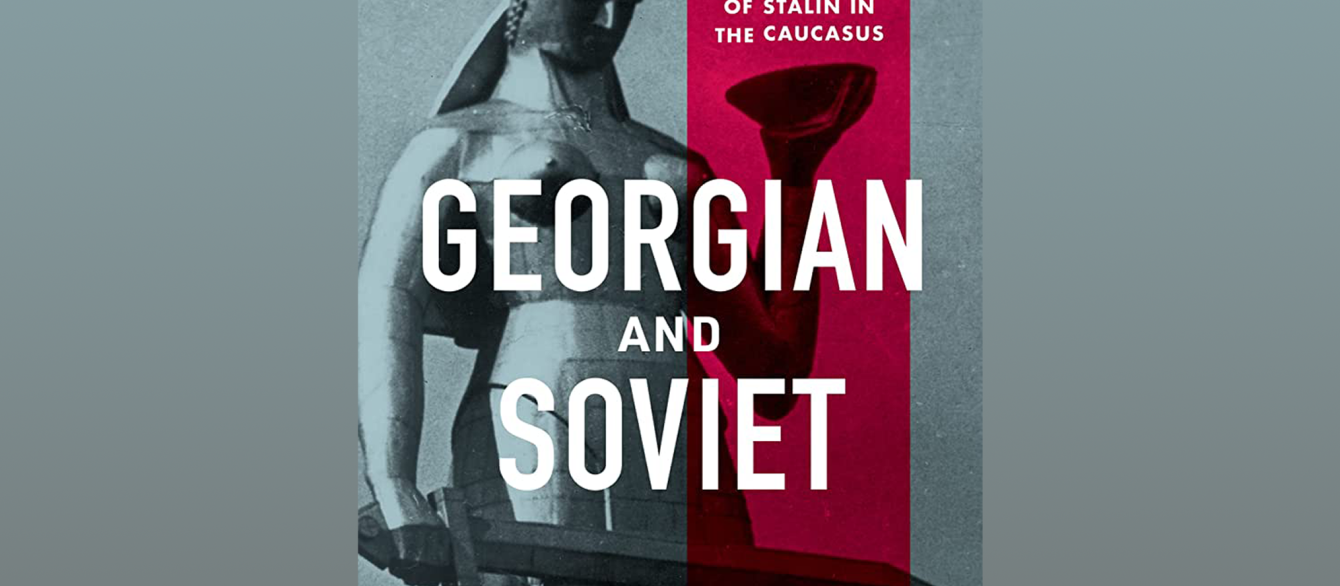What did it mean to be Georgian and Soviet? Or how did Georgians understand, engage with, and leverage the Soviet institutional system of nation-building? Finally, what role did Stalin, as a native of Georgia, play in the longer-term trajectory of Georgian nationhood? These questions are at the center of my new book, Georgian and Soviet: Entitled Nationhood and the Specter of Stalin in the Caucasus (Cornell University Press, 2023), which I recently presented at the Davis Center’s Program on Georgian Studies at Harvard.
Georgian and Soviet investigates the constitutive capacity of Soviet nationhood and empire, drawing from extensive research in Georgia’s Soviet-era archives. Invaded by the Bolshevik army in February 1921, what would become the Georgian SSR posed significant challenges for the young Bolshevik state. The Democratic Republic of Georgia between 1918-21 had been a genuinely popular, democratic government that built upon the successes of a half-century development of the Georgian national intelligentsia. The Bolsheviks therefore had little local support in Georgia, and at the same time faced a Georgian political class with a strong sense of national identity rooted in language and pre-modern and recent histories of statehood.
Once the Bolshevik leadership elaborated its nationality policy from 1923, the Soviet republic of Georgia received the same nation-building template as other national republics of the USSR. This entailed official support for Georgian language, the expansion of education, party membership, and job opportunities for ethnic Georgians residing in the territory of the GSSR. This process also entailed the consolidation of census nationality and linguistic categories into a single Georgian category, as well as clearly defined territorial borders, and support for crafting a national historical narrative and cultural canon.
Ethnic Georgians comprised between 60-70% of the republic’s population throughout the Soviet period, and most ethnic Georgians (95% or more) in the USSR resided in the republic. Georgia boasted disproportionately high communist party membership and higher education levels for its majority nationality. There was relatively low penetration of Russian as a second language, and throughout the 70-year existence of the GSSR, the republic had ethnic Georgian leadership. Georgian politicians, diplomats, scholars, writers, and engaged citizens used these tools of Soviet nation-building, and in many cases went beyond them, to pursue and claim their national rights as they understood them in varying ways throughout the Soviet period.
Yet Stalin's Georgian heritage, intimate knowledge of Caucasian affairs, and personal involvement in local matters as he ascended to prominence, left his homeland to confront a distinct set of challenges after his death in 1953. While a Union-wide “cult of Stalin” was carefully constructed and promoted from Moscow in the Stalin era, a peculiar national variant of the Stalin cult developed in parallel among Georgians in Georgia that proved challenging for subsequent generations. The compromise struck between Moscow and Tbilisi following a violent crackdown against Georgian demonstrators in March 1956 ushered in a more hands-off arrangement that facilitated, on the one hand, the modernization and nationalization of the republic’s capital, but on the other, a flourishing second economy Soviet leaders struggled to control. It was precisely in this period, when Georgians did not have a (perceived or genuine) ethnic patron in Moscow after the death of Stalin and fall of Lavrenti Beria, that a specific form of Soviet Georgian nationhood reached its apex. The post-Stalin era saw mass, popular mobilization against the perceived national denigration of Stalin by Khrushchev in 1956, against an attempt to downgrade the Georgian language’s status in the republic’s constitution in 1978, and protests against Abkhaz calls for independence in 1989. In 1956 and 1989, the popular protests were met with a violent and tragic response by the Soviet army.
Georgian and Soviet reveals that the republic-level national hierarchies that the Soviet Union created laid the foundation for the claims of nationalizing states that would emerge from the empire's collapse in 1991. Today, Georgia still grapples with the legacies of its Soviet century, and the Stalin factor likewise lingers as new generations of Georgians reevaluate the symbiotic relationship between Soso Jughashvili and his native land.






